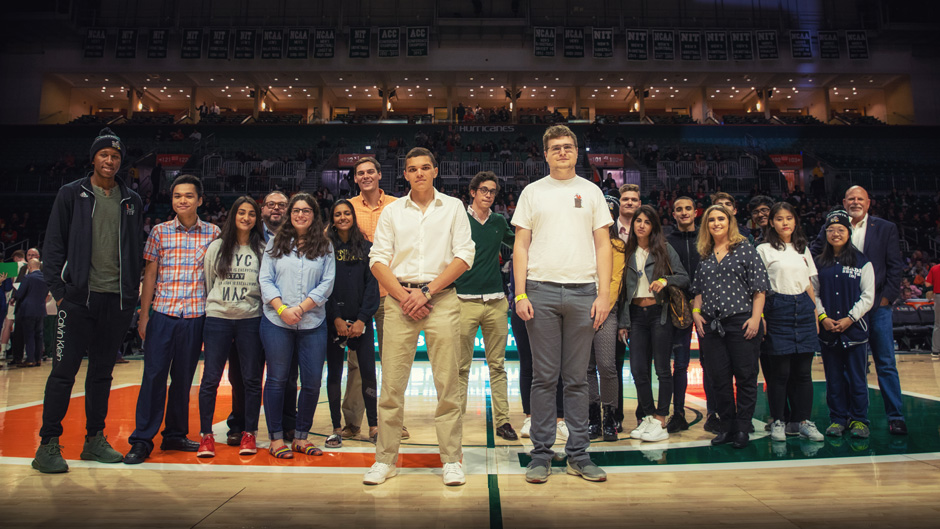When the University of Miami Debate Team arrived at the Atlantic Coast Conference (ACC) Debate Championship Tournament last March, they were perceived as the bridesmaid who would never be a bride.
“Historically, we were always number two,’’ said Artem Sviridov, a senior in the College of Engineering.
But by the end of the tournament, Sviridov, along with Zachary Homeijer, a feisty sophomore who studies political science and economics, clinched the title of ACC champion against Clemson, propelling the team to the top and bringing the treasured trophy to Coral Gables.
Debating in the civic style, Sviridov and Homeijer argued compellingly for the use of “death panels” (composed of doctors, ethicists, and legal experts) to determine whether a terminally ill patient can continue to get medical treatment. Then, as is customary in that style of debate, they argued against the use of such panels.
For Sviridov, that part of the exercise touched a personal cord. He lost his father to cancer when he was 10 years old. “It was very much an emotional thing for me,” he said.
On Nov. 28, Sviridov and Homeijer stood with their debate team as they took center court at the Watsco Center during the UM-Rutgers men’s basketball game to be honored for their achievements and the ACC title.
Hard work and constant preparation are a staple for this 30-member team that meets once a week for a two-hour class at the School of Communication, where they strategize, practice, and learn from their coach David Steinberg, who has been at this for the past 29 years, and Patrick Waldinger, assistant director of debate and lecturer.
“They are phenomenal,” said Steinberg, School of Communication professor of professional practice, talking about the team. “I would put us up against any team in the country. In the last several years we have averaged more than 40 people competing in intercollegiate competition every year.”
Besides doing their UM classwork, most team members devote more than 10 hours a week to prepare for tournaments at other colleges and universities throughout the year. Some members of UM Debate travel to 10 to 15 tournaments a year.
“Time management is something we definitely learn,” said Julia Lynch, a junior and top debater who manages to keep a 4.0 GPA studying finance and business law, while fully participating in debate. “But I find that I work best when I have several things to do and debate takes me away from just studying finances.”
Although winning competitions is a constant goal for the team, Steinberg said that it is secondary to the primary goal.
“Competition is simply a means to an end,” he said. “Debate is a co-curricular activity measured by the amount of participation and the educational benefit to come out of it.”
For debaters those benefits are many. Participants hone skills such as public speaking, critical thinking, research skills, listening, language, and writing skills. All this can help them in whatever chosen career they pursue.
“In high school I had to give a presentation in English class and I was actually shaking,” said Sviridov. “So when I came to UM I decided that the easier way to learn how to present was to force it on myself.”
Debating in various styles—civic, policy, and Parliamentary— also exposes the students to different ways to prepare their arguments and thus expands their acumen, said Steinberg.
Senior Kyle Kingma has participated in the Parliamentary Debate many times during his four years at UM and is used to getting the topic he has to debate a mere 15 minutes before the debate.
“You have to be able to think quickly on your feet and build upon your opponent’s arguments,” he said. Keeping up with current events and doing extensive research is essential for all debaters. They consult newspapers and magazines but also academic journals and periodicals. They use Google Scholar and Lexus Nexus, as well.
Lynch, who with then-UM senior Leandra Lopez won the prestigious Lafayette Debates in April, spent months researching French history, particularly the student riots of May 1968, a very violent time in that country, which was the topic to be debated.
During the competition, sponsored by George Washington University and the French Embassy, Lynch and Lopez defended and then debunked the notion of whether violence was justified by police in dealing with the French students.
Ironically, they won against a French School, the Ecole de Guerre. The top prize included a one-week trip to Paris, which they took during the summer. “It was my very first time in Europe,” said Lynch. “It was the most incredible experience of my life.”
Steinberg said that another advantage UM students have is being exposed to public debates. UM has hosted the Rwandan and the Irish Debate Teams in public debates where the general audience includes people from the community and other students.
“So the debaters are adapting complex material for a simple and clear presentation,” said Steinberg. “A public debate is about people learning and enjoying the exchange of ideas.”
To learn more about the UM Debate team and for information on how to join, visit: https://debate.miami.edu/join/

